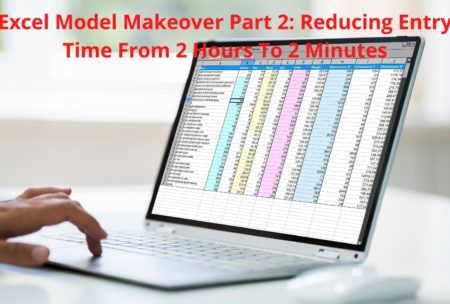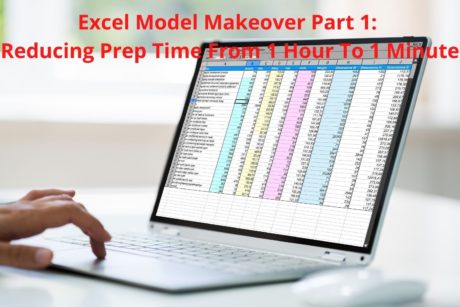This course is designed for those interested to learn more about Excel modeling, discover methods to build validation and auditing functionality into your models and master the best practices of designing, modeling and validating an accounting model. Read more.
Lenny has over 15 years combined experience in financial planning and analysis (FP&A), financial reporting and modeling, and compliance auditing.
Access all courses in our library for only $9/month with All Access Pass
Get Started with All Access PassBuy Only This CourseAbout This Course
Who this course is for:
- Business managers
- Accounting professionals
What you’ll learn:
- Master the best practices of designing, modeling and validating an accounting model
- Recognize when to data entry and when not to
- Understand 4 best practices in building a data entry model
- Identify 2 best practices in building an accounting summary model
- Discover methods to build validation and auditing functionality into your models
Requirements:
- Basic Excel knowledge. Example: be able to open one Excel file and connect to external data files, etc.
The course is presented in four parts.
First, the course introduces a business case of an “accounting” model that unintentionally includes all the hurdles to prevent fast data entry. The model takes a staff 1+ hour to update 1 vessel file, and what’s worse, it takes over 2 hours to generate an up-to-date Status Report for a fleet of 60 vessels!
Next, the course will demonstrate how the author has overhauled the old model so that it:
- Reduces the data entry and report time from 1 hour to 1 min, and
- Reduces the integration time from 2 hours to 2 minutes!
Third, we draw a line between when to data entry and when not to. Generally speaking, we need to avoid data entry as much as possible, thanks to the technologies. However, if you do need data entry, only enter data at a minimum with the remaining filled in from data extracts.
Fourth, we demonstrate the 7 Dos and Don’ts in data entry, reporting, and validations. Some of the best practices are:
- Do not enter data in a summary table, making it hard to update
- Do not enter invoice details in a cell note, resulting in double entry
- Do not apply accounting debits or credits in entry form, which may confuse data entry clerks
- Do not summarize on moving targets
Last, the course illustrates some advanced modeling skills on:
- How to build validation and auditing checks
- How to quickly set up links to 60 vessel files
Our Promise to You
By the end of this course, you will have learned Excel model makeover.
10 Day Money Back Guarantee. If you are unsatisfied for any reason, simply contact us and we’ll give you a full refund. No questions asked.
Get started today and learn more about Excel modeling.
Course Curriculum
| Section 1 - Introduction And Overview | |||
| Introduction | 00:00:00 | ||
| Real Business Case: Charter Hire Overview | 00:00:00 | ||
| Before And After The Makeover | 00:00:00 | ||
| Your Instructor | 00:00:00 | ||
| Comparison With Other Courses | 00:00:00 | ||
| What You Get From This Course | 00:00:00 | ||
| Downloadable - Exercises | 00:00:00 | ||
| Downloadable - Source Files | 00:00:00 | ||
| Section 2 - Data Entry Best Practices | |||
| The Basics | 00:00:00 | ||
| Data Entry Modeling Best Practice 1 | 00:00:00 | ||
| Data Entry Modeling Best Practice 2 | 00:00:00 | ||
| Data Entry Modeling Best Practice 3 | 00:00:00 | ||
| Data Entry Modeling Best Practice 4 | 00:00:00 | ||
| Data Entry Reporting Best Practice 5 | 00:00:00 | ||
| Data Entry Reporting Best Practice 6 | 00:00:00 | ||
| Data Entry Validation Best Practice 7 | 00:00:00 | ||
| Section 3 - Advanced Modeling Techniques | |||
| Advanced Modeling Technique 1 | 00:00:00 | ||
| Advanced Modeling Technique 2 | 00:00:00 | ||
| Advanced Modeling Technique 3 | 00:00:00 | ||
| Summary: Comparison Of Old Model And Makeover Model | 00:00:00 | ||
| Section 4 - Course Takeaways | |||
| Takeaways | 00:00:00 | ||
| Next Course | 00:00:00 | ||
About This Course
Who this course is for:
- Business managers
- Accounting professionals
What you’ll learn:
- Master the best practices of designing, modeling and validating an accounting model
- Recognize when to data entry and when not to
- Understand 4 best practices in building a data entry model
- Identify 2 best practices in building an accounting summary model
- Discover methods to build validation and auditing functionality into your models
Requirements:
- Basic Excel knowledge. Example: be able to open one Excel file and connect to external data files, etc.
The course is presented in four parts.
First, the course introduces a business case of an “accounting” model that unintentionally includes all the hurdles to prevent fast data entry. The model takes a staff 1+ hour to update 1 vessel file, and what’s worse, it takes over 2 hours to generate an up-to-date Status Report for a fleet of 60 vessels!
Next, the course will demonstrate how the author has overhauled the old model so that it:
- Reduces the data entry and report time from 1 hour to 1 min, and
- Reduces the integration time from 2 hours to 2 minutes!
Third, we draw a line between when to data entry and when not to. Generally speaking, we need to avoid data entry as much as possible, thanks to the technologies. However, if you do need data entry, only enter data at a minimum with the remaining filled in from data extracts.
Fourth, we demonstrate the 7 Dos and Don’ts in data entry, reporting, and validations. Some of the best practices are:
- Do not enter data in a summary table, making it hard to update
- Do not enter invoice details in a cell note, resulting in double entry
- Do not apply accounting debits or credits in entry form, which may confuse data entry clerks
- Do not summarize on moving targets
Last, the course illustrates some advanced modeling skills on:
- How to build validation and auditing checks
- How to quickly set up links to 60 vessel files
Our Promise to You
By the end of this course, you will have learned Excel model makeover.
10 Day Money Back Guarantee. If you are unsatisfied for any reason, simply contact us and we’ll give you a full refund. No questions asked.
Get started today and learn more about Excel modeling.
Course Curriculum
| Section 1 - Introduction And Overview | |||
| Introduction | 00:00:00 | ||
| Real Business Case: Charter Hire Overview | 00:00:00 | ||
| Before And After The Makeover | 00:00:00 | ||
| Your Instructor | 00:00:00 | ||
| Comparison With Other Courses | 00:00:00 | ||
| What You Get From This Course | 00:00:00 | ||
| Downloadable - Exercises | 00:00:00 | ||
| Downloadable - Source Files | 00:00:00 | ||
| Section 2 - Data Entry Best Practices | |||
| The Basics | 00:00:00 | ||
| Data Entry Modeling Best Practice 1 | 00:00:00 | ||
| Data Entry Modeling Best Practice 2 | 00:00:00 | ||
| Data Entry Modeling Best Practice 3 | 00:00:00 | ||
| Data Entry Modeling Best Practice 4 | 00:00:00 | ||
| Data Entry Reporting Best Practice 5 | 00:00:00 | ||
| Data Entry Reporting Best Practice 6 | 00:00:00 | ||
| Data Entry Validation Best Practice 7 | 00:00:00 | ||
| Section 3 - Advanced Modeling Techniques | |||
| Advanced Modeling Technique 1 | 00:00:00 | ||
| Advanced Modeling Technique 2 | 00:00:00 | ||
| Advanced Modeling Technique 3 | 00:00:00 | ||
| Summary: Comparison Of Old Model And Makeover Model | 00:00:00 | ||
| Section 4 - Course Takeaways | |||
| Takeaways | 00:00:00 | ||
| Next Course | 00:00:00 | ||



